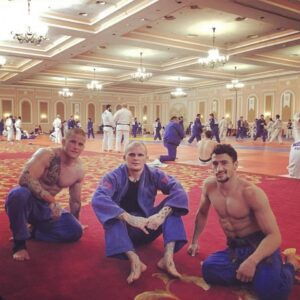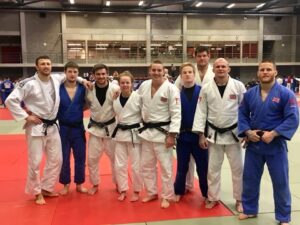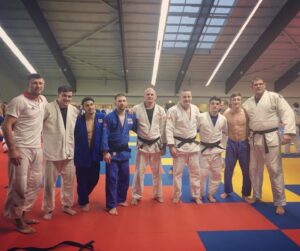
Writing about training camps in these strange times almost feels like discussing ancient history. I am quite literally giggling to myself recounting some of the funny stories from being on camps. I did have a moment where I thought, ‘Am I that person anymore? Have I matured?’ Then I look down at the history book on the desk where I’ve managed to, subconsciously in my defence, doodle male genitalia onto a roman centurion. Nope, not matured much at all, it’s just been awhile since I was on a training camp.
Last time we looked at the competing aspect of a full time Judo players lifestyle, what the tournament schedules are like. Many training camps take place directly after competitions, which to some seems odd, a lot of sports tend to have a down period after competing, why would someone want to do intense training sessions in the three to four days after a tournament? Again, last week we discussed that Judo players compete on average every 6-8 weeks, with only looking, for higher level players, to peak at 1-2 events a year. The training continues. While you have international players from all over the globe it makes sense to run a few days of training with many of them after the tournament is over. Training camp sessions are only ever randori (sparring). A tournament is done over a weekend then the camps run normally until Thursday lunchtime, most are pretty quiet by the Wednesday evening however, many fighters getting a couple of good days of high quality sparring in then head home. 2 mens sessions and 2 womens sessions per day are usually on offer.

There are more training camps being run independently of competitions nowadays, often lasting a week or so. When I first started getting out to senior training camps in 2007 a player could effectively just sneak onto a camp; fly to the location, get cheap accommodation and just go onto the mat. No one would check whether you’d gone through the official booking procedure, most of the coaches didn’t care, they were happy to have more bodies on the mat. If Great Britain sent an official delegation to the camp I’d often sleep on the floor in someones room, many, many players have done this sort of thing in the past, when I was sent by the national team I let others do the same. This sort of thing is dying out now as most camps are driven towards making more money, which I get because prize money is awarded at a lot of Judo events now, that has to come from somewhere. Strict checks using an accreditation procedure are done at the beginning of sessions now. Times have changed but I don’t regret doing any of that sort of thing when I was younger (probably would still do it now!), definitely good for the attitude.
Because of the expense of many of the longer camps nowadays (600-1000 euros a pop, flights not included) international club visits have become more popular, particularly amongst the self funded athletes; places like Valencia and Munich offer high quality training, often for a small fee or none at all. When I first moved to Camberley Judo Club back in 2009 I was told that roughly we would be doing an international training camp every 6 weeks, with one longer training trip a year to a very strong Judo nation like Japan. Most of the high level training in Japan takes place in the universities, student digs are available for those travelling out to train. The benefits of regular international training have been understood for a very long time, they’ve always been a staple in any serious Judo players lifestyle.

Camps are obviously tough, particularly when young. As a junior the senior camps can often feel like a baptism of fire but, can pull people up to a higher level very quickly. Benjamin Darbelet was 2008 Olympic Silver medallist for France and won many serious medals over his full career. In 2007, my first year of getting myself out to the senior camps (I was 18), at the Casteldefells international camp in Spain, Darbelet would ask me for a randori towards the end of every session and absolutely leather me, pretty much every exchange. I think as he got tired I was his rest/esteem rebuilding practise! I went back the next year and he hunted me out again, he stood there smiling at me before our first randori, “you bastard” I thought! I faired better but still spent most of the practise in the air or on my back. Midway through that second year of getting out to the senior camps I became British Junior number one and, after always getting a bit of a shoeing abroad, began to win some international contests, some successes that contributed to my decision to become a full time Judo player.
Camps are hard on the body and mind, training, eating and sleeping is the typical daily routine. I’ve had some brilliant laughs too, I’m not going to drop anyone, or myself, in it but, a group of rowdy early twenties combat athletes, travelling all over the world, I’m sure leaves plenty to the imagination! Camps are great, one of my favourite parts of the full time Judo lifestyle. Normally, if in a city, there is always a couple of hours or so in the evening to go and see some of the local sights. A lot of the spare time in-between sessions and during travelling, if used well, gives loads of opportunity of listening to new music, podcasts, watching films, reading, writing etcetera.

Drying the kits can be an issue between sessions. Judo players are fantastically creative with finding places to hang a kit to dry. Over stair railings, chairs in corridors, balconies, doors, light switches, televisions! That hotel has been ‘Judo-ed’ is an expression my coach uses. For your average holiday goer it must be an odd experience to arrive at your hotel and see all that!
Anyway, I hope you enjoyed that mini series and that it’s presented a bit more of an insight into the full time Judo lifestyle. Obviously what I’ve written is just my own personal perspective of it, it may differ to others. Judo is one of those sports that many different people commit many, many hours to and, often stay in it, in some capacity, for life. That passion underlying it all.
Sign up to get my free weekly newsletter (including these posts), Judo’s Weekly Weigh In, straight to your inbox!

